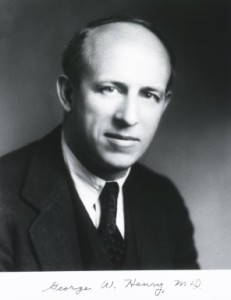Author | Graydon Gund
Photography by Elaine Johanson
 A couple weeks ago I attended a cabaret show by New York theater company The Civilians called Let Me Ascertain You: Sex Variants 1941. The performance, one in a series of others that the investigative company produces and podcasts, came about when artistic director Steve Cosson (featured image) found a book called Sex Variants by George W. Henry a quarter of a century ago in a bookstore. The book contains case studies of sexually variant people, including narcissists, bisexuals, and homosexuals. Cosson invited a whole crew of songwriters, singers, and actors to compose and perform monologues and songs based on the case studies using the text as their lyrics. Case studies in which people speak with an almost unthinkable degree of candor and intelligence for the time about their same sex experiences and a remarkable lack of concern for the sexual fluidity inherent in the majority of the subjects’ experiences. It made me wonder, have we regressed? As a society, very few people want to discuss these things, let alone cope with enjoying them, such as when subject Irena K. says about a partner “she gets a kick out of having urine in her mouth.” But for the archaic phrasing, it seems these were only things people would admit in the last decade or so. It seems almost impossible to create a document like this today.
A couple weeks ago I attended a cabaret show by New York theater company The Civilians called Let Me Ascertain You: Sex Variants 1941. The performance, one in a series of others that the investigative company produces and podcasts, came about when artistic director Steve Cosson (featured image) found a book called Sex Variants by George W. Henry a quarter of a century ago in a bookstore. The book contains case studies of sexually variant people, including narcissists, bisexuals, and homosexuals. Cosson invited a whole crew of songwriters, singers, and actors to compose and perform monologues and songs based on the case studies using the text as their lyrics. Case studies in which people speak with an almost unthinkable degree of candor and intelligence for the time about their same sex experiences and a remarkable lack of concern for the sexual fluidity inherent in the majority of the subjects’ experiences. It made me wonder, have we regressed? As a society, very few people want to discuss these things, let alone cope with enjoying them, such as when subject Irena K. says about a partner “she gets a kick out of having urine in her mouth.” But for the archaic phrasing, it seems these were only things people would admit in the last decade or so. It seems almost impossible to create a document like this today.
We see women thrilled at the prospect of stepping out of their lower sexual class and taking ownership. For example, one woman in the book says that the best is, “to be a woman and have a man’s brain.” While the period permits her from being a high-powered, Miranda Preistleyesque top dog, she relishes feeling like it in the bedroom. While another subject, African American burlesque performer Myrtle K., says “I know I’m queer but I don’t want to be reminded of it.” This subject has sexual relations with women, who are only allowed to suck on her enlarged clitoris, and never to touch her breasts, which would, presumably, bring her down to the status of other women. Shockingly, a cross dresser states that “in women’s apparel I have ‘it.’” Something indescribable that he can attain by blending in when he dresses as a woman in public, people have felt as if they were born into the wrong bodies forever, but being respected and asked about it and getting it documented demonstrates it was being recognized at least long before I thought.
The book, thank god, was also illustrated. Cosson shows pictures of parts of various subjects, but also family trees for some of the case studies. Though not all scientifically sound, these documents attempt to trace homosexuality through lineage. This German scientist was trying to convince people we were born this way over half a century before Lady Gaga. The lineage trees contain peoples’ sexually transmitted disease history as well as ancestors with artistic or musical tendencies.
The songs that comprised the evening were often musically and vocally gorgeous, lulling audience members into a false sense of artistic security before listening to the final verse and realizing one was, in fact, a man singing about his sexual relationship with the earth. This song, “I Have Had the Earth” dives into what the Civilians do best, joining art to a mission to express the real words of real people. It is so much in Brandon Davidson’s performance and beautiful swelling voice that made the audience enjoy the experience. It’s a trick, but a trick that makes you reconsider your relationship to art and how you may judge people, and why. Hearing people discuss their tortured childhoods and psychosexual histories through song lands easier on the modern ear than just a litany of problems, as demonstrated in the final song, which we have previously seen as a monologue. Wonderfully performed by the Lisps, “The Future Looks Very Fine,” which continues repeating the litany of things in a man’s past that might have screwed him up: mother is attracted to homosexual men, father is a Don Juan, etc. etc. which pounds in what is supposed to be wrong with him. But is anything wrong? As the refrain repeats “the future looks very fine,” we realize, for him, it does, although it would take others some time to catch up and realize that, for these variants, the future would be fine.





